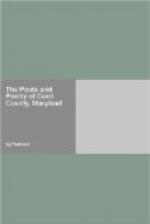When once amid its peaceful waves
No holier joy the bosom craves—
Ten thousand stars are shining bright
Yet one reflects a purer light—
No sooner does its glowing blaze
Attract the spirit’s wand’ring gaze,
Than all is turned to joy we see—
That star is Immortality.
JOHN HENRY KIMBLE.
John Henry Kimble was born in Buckingham township, Bucks county, Pennsylvania, September 8, 1850. He is the second son of Henry H. Kimble, and is descended on his father’s side from English stock, being a lineal descendant from Governor John Carver, who came to this country in the Mayflower in 1620. On his mother’s side, his grandfather, Seruch Titus, was a prominent citizen of Bucks county, and, as his name indicates, was of Italian descent.
Mr. Kimble moved with his parents to the Fourth Election district of Cecil county, in the Spring of 1855, and has been engaged in farming all his life, except two years spent in teaching in our public schools. He is a popular music teacher and performer on musical instruments, and has won local distinction as a debater.
In 1870 his first verses were published in the Morris Scholastic a newspaper published in Grundy county, Illinois. He afterwards wrote for the Cecil Whig. In 1875 he wrote “The Patrons of Husbandry,” a serial poem, which was published by the Grange organ of the State of Pennsylvania, in seven parts, with illustrations. It was pronounced by competent critics to be one of the “best and most natural descriptions of farm life ever written.” It attracted wide attention and received favorable comment from the N.Y. World and other leading papers. He wrote another serial in 1876, entitled “Two Granges.”
Mr. Kimble makes no pretensions as a writer and has never allowed his love of literature to interfere with his farm work. In the Winters of 1872, ’73 and ’74 he taught in the public schools of this county with satisfaction to his patrons.
In December, 1873, he was married to Miss Sarah Teresa Gallagher, daughter of John E. Gallagher, of the Fourth district. They have five children, three daughters and two sons. In 1880, Mr. Kimble moved from the farm near Fair Hill, where he had spent twenty-five years, to Appleton, where he still resides. He is now a frequent and popular contributor to the Cecil Democrat.
HIS LAST TUNE.
The shade of death had haunted him
Through many a weary day;
With dread disease his youthful frame
Was wasting slow away.
He took his violin and sighed,—
“I am too weak to play.”
But, rising in his cushioned chair,
He grasps, with trembling hand,
The neck and bow, and tunes the strings
And thinks of concerts grand;
And hears the crowd applauding loud
As when he led the band.




